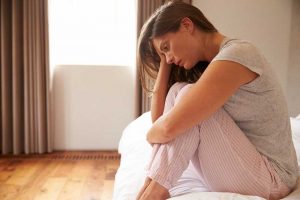Hormonal contraception use is so common that it is almost ubiquitous. However, it may be increasing the risk of depression in some women who use it.
Although millions of women worldwide use hormone contraception, the Pill and other contraceptives can have a variety of side effects. While many of these side effects are generally minor, women deserve to know exactly what they may deal with when they choose these forms of birth control. New research suggests that hormonal contraception may increase the rate of depression.
Hormonal Contraception Use and Depression
 A groundbreaking study looked at more than one million women in Denmark between the ages of 15 and 34 years. A variety of variables were tracked from their lives, including when and how often they needed to use antidepressants. Women who used hormonal contraception were more likely to need antidepressants and more likely to use them at a younger age.
A groundbreaking study looked at more than one million women in Denmark between the ages of 15 and 34 years. A variety of variables were tracked from their lives, including when and how often they needed to use antidepressants. Women who used hormonal contraception were more likely to need antidepressants and more likely to use them at a younger age.
Does this mean women who are prone to depression should not use oral contraceptives? Unfortunately research is not as clear on this point. While these women are more likely to suffer from depression, pregnancy and childbirth also carry a substantial risk of mental illness. In fact, women who are pregnant or have recently had a baby have a 13 percent risk of depression, even if you don’t count the less severe and more transient “baby blues” that occur in the days and weeks just after birth.
The Problem of Depression in Women
Depression is a huge problem for the female gender, and researchers struggle to find a single reason. Women are altogether twice as likely to suffer from depression and also more likely to develop a variety of depressive disorders such as dysthymic and seasonal affective disorders than men.
We now know that depression is not weakness or a lack of emotional fortitude, but rather a very real and measurable medical disorder that is not the sufferer’s fault. However, there is still much to learn about depression, especially why it occurs so much more often in women. The causes are likely multifactorial and complicated. Some genetic mutations that are linked to depression have been found only in women. Female hormones, which are in a constant state of flux, also likely play a role. Women tend to rank themselves as more stressed and are more likely to undergo stressful major events. In addition, women are more likely to not get the sleep that they need to sustain a healthy circadian rhythm, or 24-hour biological rhythm, which has been linked to depression in a variety of studies.
Could a Disrupted Circadian Rhythm Be Part of the Puzzle?

From hormonal contraception to pregnancy to a disrupted circadian rhythm, there are many variables that make women more likely to suffer from depression. Taking control of your sleep is the first step to feeling better and more energetic throughout your days.







